One Asian stock market you should avoid
Most Asian economies are relatively healthy in terms of debt and savings. But there is one country which is structured along dangerously 'Western' lines, and whose prospects for recovery hold up badly with its peers. Cris Sholto Heaton examines what the future may hold for Korea.

Get the latest financial news, insights and expert analysis from our award-winning MoneyWeek team, to help you understand what really matters when it comes to your finances.
You are now subscribed
Your newsletter sign-up was successful
Want to add more newsletters?

Twice daily
MoneyWeek
Get the latest financial news, insights and expert analysis from our award-winning MoneyWeek team, to help you understand what really matters when it comes to your finances.

Four times a week
Look After My Bills
Sign up to our free money-saving newsletter, filled with the latest news and expert advice to help you find the best tips and deals for managing your bills. Start saving today!
First, my apologies for not being able to bring you a MoneyWeek Asia last Monday, which was down to an unfortunate combination of illness and Monday's bad weather.
This week, as the sick man of MoneyWeek, I'm going to talk about the sick man of Asia. No, it's not Japan (although it did fill that role for many years), but another country which is at growing risk of being the regional laggard over the next few years.
I often talk about how healthy Asia's economies are in terms of debt and savings. The fact that they carry much less of a borrowing burden than the West might not be helping them avoid the global recession, but it should see them in pole position for recovery next year.
MoneyWeek
Subscribe to MoneyWeek today and get your first six magazine issues absolutely FREE

Sign up to Money Morning
Don't miss the latest investment and personal finances news, market analysis, plus money-saving tips with our free twice-daily newsletter
Don't miss the latest investment and personal finances news, market analysis, plus money-saving tips with our free twice-daily newsletter
But there is one major exception to this rule
The Asian economy with the Western disease
In many ways, South Korea looks more like a Western economy than an Asian one, despite its much higher rate of growth over the last few years. While we tend to think of it as a very export-dependent country, domestic consumption is substantially higher than peers such as China, though by no means the highest in Asia.
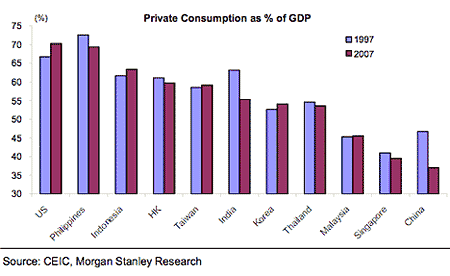
However, that domestic demand is hitched to almost Western-style debt levels, as the following charts show. Household debt is the highest in Asia (excluding Japan), although not as bad as the UK and US.
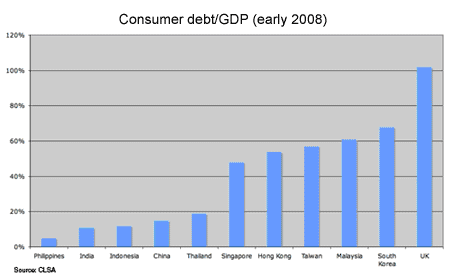
The picture for companies is similar. With Asian corporates, measures such as debt-to-equity and interest coverage can be rather inconsistent between different sources, but Korean companies regularly come out with high debt-to-equity ratios and low interest coverage.
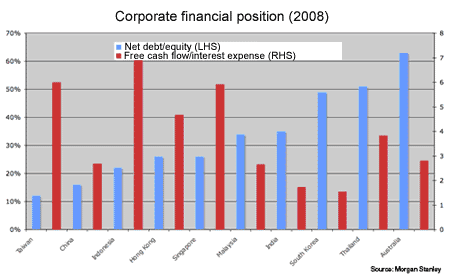
To be fair, the debt burden is substantially lower than it was during the 1997-98 crisis Korean firms overall have been deleveraging in the last decade. But this disguises some big disparities in the sector: larger companies and conglomerates are generally thought to be in pretty good shape, while small to medium-sized firms are much weaker.
Korea's banking problems
None of these would individually be huge issues we can see that, in each case, Korea isn't alone in Asia. What makes the country stand out is that it's the only major Asian economy that ticks all the boxes.
On top of that, the banking system suffers from many of the same problems as the West. Korean banks have extremely high loan-to-deposit ratios, meaning that they are very dependent on borrowing in the wholesale markets. Much of this is foreign currency borrowings around 10% of their total funding. As you'll no doubt remember, it was heavy dependence on wholesale funding that spelled doom for banks such as Northern Rock, HBOS and the Icelandic trio.
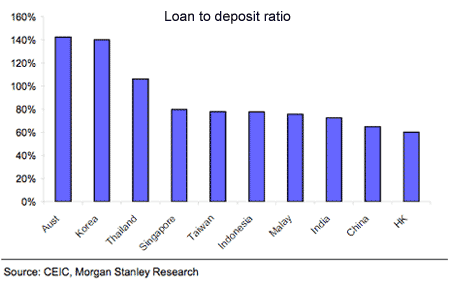
So with global credit markets barely thawing, conditions remain very tight in the Korean banking sector. Korea was one of four countries that the US Federal Reserve set up dollar swap agreements with at the peak of the crisis in an effort to ease liquidity. the Korean government is trying to ease strains in the sector; and, while a financial crisis in Korea looks unlikely, it is the biggest potential flashpoint in Asia. It's for this reason that the won is down 32% over the last year and Korean banks have to pay three times more to borrow in the markets compared to pre-crisis levels.
The worst year for Korea since the Asian crisis
Making matters worse, the economy is extremely weak. A couple of weeks ago, I showed a chart of the plunge in Korean exports, which are down 33% year-on-year in January. But this isn't the economy's only problem. Domestic demand is collapsing: private consumption fell by 4.8% quarter-on-quarter at the end of 2008, while investment contracted 8.8% quarter-on-quarter. The over-indebted domestic sector seems to be cutting back, just as in the US and UK.
In short, Korea has both the problems affecting its Asian neighbours (plummeting exports) and the problems hurting the West (a tapped-out domestic economy). The outlook is pretty bleak: Capital Economics expects the economy to contract by 5% this year and barely grow in 2010. That's almost as bad as during the Asian crisis and recovery is likely to be a lot more sluggish this time.
Korea also faces some of the biggest external problems of any economy in Asia. If consumers are over-indebted and tapped out, in contrast to its peers, Korea will be quite dependent on exports to buoy the economy over the next few years. In that respect, it may look encouraging that China is its biggest export destination, as you can see below. After all, China is expected to be the strongest major economy in the near future.
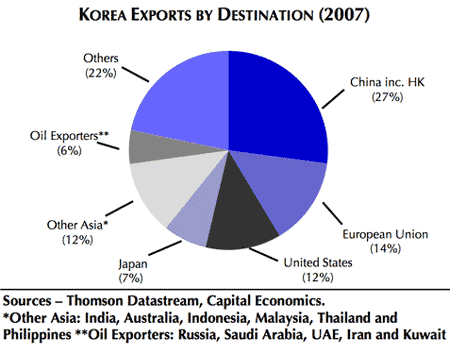
But China is a threat as much as an opportunity to its Asian peers that export to it, because as it moves up the value chain it will start to replace much of these exports with domestically-produced goods. And Korea seems the worst placed to respond to this shift.
In contrast to Malaysia or Thailand, Korea doesn't have a large commodity component to its exports. Unlike Indonesia, India, Vietnam or Cambodia, it doesn't have low-wage workers who will be able to take on the kind of manufacturing that China is aiming to leave behind. And while Taiwan, which faces a similar threat to its electronic manufacturing industry, can benefit from closer economic ties with China many Chinese factories are owned by Taiwanese firms - the same is unlikely to be true of Korea.
And there's also the issue of North Korea - not just the security threat, but the long-term prospect of reunification when the Kim regime finally falls. For the sake of the North Korean population, this can't happen soon enough. But you'll recall that Germany's reunification was a drag on the richer West German economy for many years.
The disparity between North and South Korea is far greater. Hopefully, a gradual reunification over many years will be possible but even so, this will be a hugely complex and expensive process for Korea to navigate.
Korean companies treat shareholders as a nuisance
Of course, just because a country faces headwinds doesn't mean it's a bad investment: it depends how cheap markets are. The good news is that Korea is cheap by its historic standards and very cheap on some measures. Today, the Kospi trades on a price/book ratio of under one.
The bad news is that it's certainly not cheap on some of the other criteria that I regard as important. Crucially for income-focused investors, the forecast dividend yield is just 2.2% higher than usual, but still pathetically low in a global context.
Sometimes as in China and India low dividends reflect an exceptionally fast-growing corporate sector, but in Korea they really reflect a corporate culture that often treats shareholders as a nuisance. Like Japan, much of the corporate sector consists of groups of business tied together by interlocking shareholdings, which are known as chaebol. These groups, supported by the government, have been very successful in developing Korea's economy to date but not always so good at delivering value for shareholders.
Overall, the broader market doesn't very attractive from a long-term, value- and income-orientated perspective. While Korea has some excellent firms, a combination of poor value and poor prospects means it looks like one of the less attractive ways to invest in Asia's future.
Turning to the markets
table.ben-table table { border: 3px solid #2b1083;font: 0.928em/1.23em verdana, arial, sans-serif;}
th { background: #2b1083; padding: 10px 5px;color: white;font-weight: bold;text-align: center;border-left: 1px solid #a6a6c9;}th.first { border-left: 0; padding: 5px 2px;text-align: left;}
tr {background: #fff;}
tr.alt {background: #f6f5f9; }
td { padding: 5px 2px;text-align: center;border-left: 1px solid #a6a6c9;color: #000;vertical-align: center;}td.alt { background-color: #f6f5f9; }
td.bold { font-weight: bold; }td.first { border-left: 0; text-align: left;}
| China (CSI 300) | 2,237 | +10.1% |
| Hong Kong (Hang Seng) | 13,655 | +2.8% |
| India (Sensex) | 9,301 | +1.3% |
| Indonesia (JCI) | 1,351 | +1.4% |
| Japan (Topix) | 791 | -0.4% |
| Malaysia (KLCI) | 897 | +1.4% |
| Philippines (PSEi) | 1,942 | +6.4% |
| Singapore (Straits Times) | 1,715 | -1.8% |
| South Korea (KOSPI) | 1,210 | +4.1% |
| Taiwan (Taiex) | 4,471 | +5.3% |
| Thailand (SET) | 444 | +1.5% |
| Vietnam (VN Index) | 282 | -7.1% |
| MSCI Asia | 77 | -0.1% |
| MSCI Asia ex-Japan | 280 | +3.0% |
Chinese equities bounced strongly last week on suggestions the economy was recovering. A number of indicators including bank lending and manufacturing surveys suggested that growth could begin to rebound in this quarter. However the message from the data was considerably more ambiguous than initial market and analyst reactions suggested, and any strong recovery in the first half of 2009 still looks a long shot.
Meanwhile, the news from Japan over the last couple of weeks has been awful. Industrial production plunged by a record 9.6% month-on-month in December. Core private sector machinery orders an indicator of investment plans declined 1.7%, the third straight fall, following a record 16.2% plunge in November. Corporate bankruptcies rose to a six-year high and consumer confidence surveys to all-time lows. The Bank of Japan announced plans to buy shares in struggling banks, saying that it would help stabilise the system. Some commentators were less kind, drawing comparisons with the country's excessively drawn-out banking bailout of the late nineties.
Sovereign wealth fund (SWF) watchers cheered the news that Temasek, one of Singapore's SWFs, is appointing BHP Billiton's former chief executive Chip Goodyear as its new chief executive. Goodyear is the first foreign national to head an SWF and replaces Ho Ching, the prime minister's wife. After several years of strong performance, Temasek's record has been tarnished this year by its decision to invest in Western financial institutions including Merrill Lynch and Barclays.
Having been too optimistic on the way up, ratings agencies are now rushing to cut their assessment of firms' creditworthiness. Among other actions, Standard and Poor's cut ratings on Indian steelmaker Tata Steel, while Moody's downgraded or placed on review a number of Singaporean real estate investment trusts.
This article is from MoneyWeek Asia, a FREE weekly email of investment ideas and news every Monday from MoneyWeek magazine, covering the world's fastest-developing and most exciting region. Sign up to MoneyWeek Asia here.
Get the latest financial news, insights and expert analysis from our award-winning MoneyWeek team, to help you understand what really matters when it comes to your finances.

Cris Sholt Heaton is the contributing editor for MoneyWeek.
He is an investment analyst and writer who has been contributing to MoneyWeek since 2006 and was managing editor of the magazine between 2016 and 2018. He is experienced in covering international investing, believing many investors still focus too much on their home markets and that it pays to take advantage of all the opportunities the world offers.
He often writes about Asian equities, international income and global asset allocation.
-
 Plan 2 student loans: a tax on aspiration?
Plan 2 student loans: a tax on aspiration?The Plan 2 student loan system is not only unfair, but introduces perverse incentives that act as a brake on growth and productivity. Change is overdue, says Simon Wilson
-
 Early signs of the AI apocalypse?
Early signs of the AI apocalypse?Uncertainty is rife as investors question what the impact of AI will be.